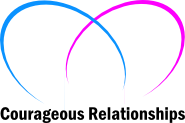If there’s one question I get asked a lot outside the counselling rooms, it’s something along the lines of “when should you go to relationship counselling ?”. The short answer is whenever you feel it’s necessary. The long answer, well like I said it’s long, so I’ll try to shorten it.

By: Nina Matthews – CC BY 2.0
Many couples try to resolve their issues themselves without any form of counselling, great if it works but what tends to happen is that we quite often repeat the same mistakes, the same behaviour that got us there in the first place or try the same thing over and over expecting a different result.
An example is that Mona tries to talk to Fred about the fact that the relationship is going bad. She would like him to sit down and discuss things but it falls on deaf ears. So, Mona tries talking to him again and again and again thinking of course he’ll hear me. Well maybe he’s not hearing you, maybe he thinks it’s all good, maybe he thinks a lot of things, or nothing. Mark Gungor talks about mens “Nothing Box”. It could explain some things. ![]()
Whatever is going on, remember that it’s the behaviour that’s the problem, focus on that. Once we focus on bringing the person down then we have become part of the problem.
So, how about if we talk to friends and family ? Great idea but quite often causes more problems. Involving a third party can create a triangle based on conflict and quite often involves someone with a vested interest, their friendship/relationship. To put it another way, what can happen is that the third person will generally take sides. That’s what friends and family tend to do, they love us and want to protect us. When we bring friends and family into these types of situations we put them in a (sometimes quite uncomfortable) position where they feel they need to choose, do they tell the truth (as they see it from there limited viewpoint) and risk the relationship or do they take sides and avoid risking the relationship.
After all they know everything that goes on in our relationship (including our own behaviour), every little detail good and bad, don’t they ? ![]()
Another problem this can create is resentment. Resentment that personal stuff is being discussed outside the relationship, that the third person now knows stuff that may paint the partner in a less than flattering light and quite often with a biased view of the situation. Not pleasant for your partner and not pleasant for the third party.
Don’t get me wrong, friends and family are a great support resource but when the forum is being used to denigrate or put down your partner, maybe that aspect needs to be looked at more closely.
Trying to repair the relationship when you can’t stand your partner is hard work, real hard, we struggle with our feelings (or lack of them) and at the same time trying to change behaviour/habits. Counselling can help.
Give relationship counselling a go.
You know the old saying “a stitch in time saves nine” ? Well that’s a great principle to follow in your relationship. When things start getting difficult, do something about it.
Read books, try getting back to things like date night, turn the TV off, put the phone in another room, spend 15 minutes a day talking with your partner, not about the business of being in a relationship or being parents but about each others day, their life, dreams, worries, whatever connects the two of you. If that doesn’t work, seek help, see someone that specialises in relationships. Oh and that doesn’t mean wait a year or two or sometimes even more, really I’m talking months, leaving it longer runs the risk of one or both of you disengaging or becoming resentful.
I am quite often told that the other partner doesn’t think there’s anything wrong or doesn’t want to get help. That’s pretty common. If I was going to stereotype or generalise…. guys tend to be the ones. ![]() Here’s a tip, if your partner says they are unhappy or the relationship isn’t right, listen. Listen to what they are trying to tell you, what they are feeling, try not to focus on the detail too much because we run the risk of becoming defensive then the arguments can really start.
Here’s a tip, if your partner says they are unhappy or the relationship isn’t right, listen. Listen to what they are trying to tell you, what they are feeling, try not to focus on the detail too much because we run the risk of becoming defensive then the arguments can really start.
There are all sorts of reasons why people choose not to seek relationship counselling, so I’ll quickly talk about a few.
One or both truly believe that there’s nothing wrong and it will get better by itself. Yes, sometimes it does get better, sometimes the stresses of life get on top of us, overwhelm us. So what’s wrong with getting a check up anyway, just in case ?
Fear of judgement would be a biggie. If you are seeing someone you will most probably have to talk about some stuff that might be a bit embarrassing or that you might feel judged. If you do feel judged say so, nicely, I’m sure your counsellor would like to know. Sometimes it’s more about hearing what we don’t want to hear that’s the problem, once again be courageous and mention to them that you are struggling with it, I’m sure they would like to know. If they continue judging you then find someone else. Don’t think all counsellors are the same, we’re not.
Another one is that we don’t talk about personal stuff with other people, it’s just not done ! Well a relationship counsellor isn’t just another person, they specialise in relationships and what I mean is that their speciality is relationships, sounds strange but it’s important. It’s like when the gearbox in your car needs servicing and you take your car to a car specialist, not a (car) gearbox specialist, there’s a big difference.
Anyway, their focus is to help you achieve whatever it is you are trying to achieve. Whether it’s about enhancing the relationship, working on better strategies to work together on it or even to separate.
So what happens if only one wants to see a counsellor ? That’s ok. Go see them. Maybe all it needs is an unbiased perspective to help clear things up. But then again, it might be about adjusting your expectations, clarifying what you are needing or looking for. Quite often the change in behaviour of one person can create change in the other. Maybe it’s about not buying into the argument put before you and finding ways to stay out of it.
Ultimately it’s about trying to work out what’s going wrong and find better ways of dealing with these things. Of course, if through the process someone decides that there’s nothing left in the tank then that needs to be addressed quickly and certainly not swept under the carpet.
Remember, it takes courage to see a specialist and more to walk through the door, believe me I know. We do it when we are physically unwell so why not when our relationship is not well too ?
So the short answer to the long answer is sooner the better.
Andrew is a Couples Coach in his private practice, Kardinya Counselling located in Werribee & Point Cook, Victoria. After working in the IT industry for 15 years, he started following his passion of helping couples find a better way of relating.
